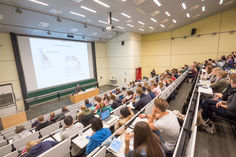Molecular Diagnostics for Familial Cancer
Project Management
Prof. Dr. med. Christian Schaaf
Focus
University Professor in Human Genetics (W3)
Sekretariat Prof. Dr. med. C. Schaaf
Laboratory Management

Dr. rer. nat. Christian Sutter
Focus
Hereditary tumor diseases, Head of Sanger sequencing core
Breast Cancer is the most common tumor occuring in women. Improved cancer cure is not only the result of new therapeutic approaches, but also the result of improved options of early detection of neoplasia. In Germany every year 40.000 new cases of breast cancer are diagnosed. On average one out of ten women will suffer from breast cancer during lifetime. Approximately 5% of breast tumors occur on a hereditary basis, up to 25% of causative genetic alterations are detected in the high-penetrance genes BRCA1 und BRCA2 while the remainder may be explaned by combinations of variants in low-penetrance susceptibility genes.
Topic of current research is the identification of low-penetrance susceptibility genes in BRCA1/ BRCA2 mutation-negative breast cancer families as well as identification of genes modifying breast cancer risk in families carrying a BRCA1/ BRCA2 germline mutation.
1. CCPRB (Cancer Control using Population-based Registries and Biobanks)
Work Package JER-2 (Genetic Epidemiology of Cancer, EU research program), until 31.05.09.
Based on molecular epidemiologic approaches in a collaborative research program together with Prof. Hemminki and Prof. Burwinkel, German Cancer Research Center, Heidelberg, it is planned to identify genes associated with familial breast cancer. This approach is carried out on the basis of thoroughly characterized cohorts of patients' samples where BRCA1/ BRCA2 mutations have been excluded (high and low risk breast cancer families).
Respective DNA samples are collected in a biobank and provided by the Institute of Human Genetics for the identification of low-penetrance genes associated with breast cancer risk.
So far, numerous genetic alterations in genes associated with breast cancer risk could be identified and published.
2. Genome-wide association study regarding familial breast cancer (German Cancer Aid)
Based on more than 1000 thoroughly documented cohorts of high-risk breast cancer families where causative BRCA1/ BRCA2 mutations had been excluded it is planned to identify breast cancer predisposing genes or gene variants.
This approach will be carried out by linkage disequilibrium studies on patients' samples using 500K Affymetrix gene chips compared to age-adjusted patient controls. In a second step detailed mapping using SNP markers will be carried out to identify putative candidate genes. Respective DNA samples are collected in a biobank and provided by the Institute of Human Genetics.
3. International collaboration research program of the German Consortium for Familial Breast Cancer with theCIMBA Consortium (Consortium of Investigators of Modifiers of BRCA1/2) to identify genetic variants modifying breast cancer risk
In this international study (Coordinator for Germany: Prof. R.K. Schmutzler, Cologne) patients/ families with already identified causative germline mutation for familial breast and ovarian cancer are investigated regarding additional genetic alterations which might influence breast cancer risk.
This approach is carried out on cohorts of thoroughly molecularly characterized samples which are provided by the Institute of Human Genetics to the CIMBA collaborating program for association studies.
Team members:
Farnoosh Fathali Zadeh, biotechnologist
Former members:
Jochen Meyer, technician
Verena Wahl, technician
Collaborations:
Prof. Dr. Kari Hemminki, DKFZ Heidelberg
Prof. Dr. Barbara Burwinkel, Women's Hospital, University of Heidelberg
Prof. Dr. Rita Schmutzler
Prof. Dr. Alfons Meindl
and the German Consortium for Hereditary Breast- and Ovarian Cancer (GC-HBOC)
Selected Publications
Breast cancer characteristics and surgery among women with Li‐Fraumeni syndrome in Germany—A retrospective cohort study.
N. Rippinger, C. Fischer, H. Sinn, N. Dikow, C. Sutter, K. Rhiem, S. Grill, F. W. Cremer, H. P. Nguyen, N. Ditsch, et al.
Cancer Med. 2021 Sep 26;10(21):7747-7758. doi: 10.1002/cam4.4300.
The predictive ability of the 313 variant–based polygenic risk score for contralateral breast cancer risk prediction in women of European ancestry with a heterozygous BRCA1 or BRCA2 pathogenic variant.
I. M. Lakeman, A. J. van den Broek, J. A. Vos, D. R. Barnes, J. Adlard, I. L. Andrulis, A. Arason, N. Arnold, B. K. Arun, J. Balmaña, et al.
Genetics in Medicine. 2021 Sep;23(9):1726-1737. doi: 10.1038/s41436-021-01198-7.
Breast and Prostate Cancer Risks for Male BRCA1 and BRCA2 Pathogenic Variant Carriers Using Polygenic Risk Scores.
D. R. Barnes, V. Silvestri, G. Leslie, L. McGuffog, J. Dennis, X. Yang, J. Adlard, B. A. Agnarsson, M. Ahmed, K. Aittomäki, et al.
JNCI. 2021 Jul 28;114(1):109-122. doi: 10.1093/jnci/djab147.
Performance of Breast Cancer Polygenic Risk Scores in 760 Female CHEK2 Germline Mutation Carriers.
J. Borde, C. Ernst, B. Wappenschmidt, D. Niederacher, K. Weber-Lassalle, G. Schmidt, J. Hauke, A. S. Quante, N. Weber-Lassalle, J. Horváth, et al.
JNCI. 2020 Dec 29;. doi: 10.1093/jnci/djaa203.
Germline testing for homologous recombination repair genes—opportunities and challenges.
S. Hirsch, L. Gieldon, C. Sutter, N. Dikow, C. P. Schaaf.
Genes Chromosomes Cancer. 2020 Oct 29;60(5):332-343. doi: 10.1002/gcc.22900.
Polygenic risk scores and breast and epithelial ovarian cancer risks for carriers of BRCA1 and BRCA2 pathogenic variants.
D. R. Barnes, M. A. Rookus, L. McGuffog, G. Leslie, T. M. Mooij, J. Dennis, N. Mavaddat, J. Adlard, M. Ahmed, K. Aittomäki, et al.
Genetics in Medicine. 2020 Oct;22(10):1653-1666. doi: 10.1038/s41436-020-0862-x.
Cancer surveillance and distress among adult pathogenic TP53 germline variant carriers in Germany: A multicenter feasibility and acceptance survey.
N. Rippinger, C. Fischer, M. W. Haun, K. Rhiem, S. Grill, M. Kiechle, F. W. Cremer, K. Kast, H. P. Nguyen, N. Ditsch, et al.
Cancer. 2020 Jun 18;126(17):4032-4041. doi: 10.1002/cncr.33004.
Criteria of the German Consortium for Hereditary Breast and Ovarian Cancer for the Classification of Germline Sequence Variants in Risk Genes for Hereditary Breast and Ovarian Cancer.
B. Wappenschmidt, J. Hauke, U. Faust, D. Niederacher, L. Wiesmüller, G. Schmidt, E. Groß, A. Gehrig, C. Sutter, J. Ramser, et al.
Geburtshilfe Frauenheilkd. 2020 Apr;80(04):410-429. doi: 10.1055/a-1110-0909.
Fine-mapping of 150 breast cancer risk regions identifies 191 likely target genes.
L. Fachal, H. Aschard, J. Beesley, D. R. Barnes, J. Allen, S. Kar, K. A. Pooley, J. Dennis, K. Michailidou, et al.
Nat Genet. 2020 Jan;52(1):56-73. doi: 10.1038/s41588-019-0537-1.
Association of Genomic Domains in BRCA1 and BRCA2 with Prostate Cancer Risk and Aggressiveness.
V. L. Patel, E. L. Busch, T. M. Friebel, A. Cronin, G. Leslie, L. McGuffog, J. Adlard, S. Agata, B. A. Agnarsson, M. Ahmed, et al.
Cancer Res. 2020 Feb 1;80(3):624-638. doi: 10.1158/0008-5472.CAN-19-1840.
Large scale multifactorial likelihood quantitative analysis of BRCA1 and BRCA2 variants: An ENIGMA resource to support clinical variant classification.
M. T. Parsons, E. Tudini, H. Li, E. Hahnen, B. Wappenschmidt, L. Feliubadaló, C. M. Aalfs, S. Agata, K. Aittomäki, E. Alducci, et al.
Hum Mutat. 2019 Sep;40(9):1557-1578. doi: 10.1002/humu.23818.
Investigating the effects of additional truncating variants in DNA-repair genes on breast cancer risk in BRCA1-positive women.
I. Sepahi, U. Faust, M. Sturm, K. Bosse, M. Kehrer, T. Heinrich, K. Grundman-Hauser, P. Bauer, S. Ossowski, H. Susak, et al.
BMC Cancer. 2019 Aug 8;19(1):787. doi: 10.1186/s12885-019-5946-0.
The GPRC5A frameshift variant c.183del is not associated with increased breast cancer risk in BRCA1 mutation carriers.
K. Klaschik, J. Hauke, G. Neidhardt, C. Tränkle, H. M. Surowy, S. Heilmann‐Heimbach, G. Rappl, E. Mangold, N. Arnold, D. Niederacher, et al.
Int J Cancer. 2019 Apr 1;144(7):1761-1763. doi: 10.1002/ijc.32016.
Indikationsstellung zur prophylaktischen Mastektomie.
S. Oral, E. Katagis, N. Rippinger, J. Nees, J. Heil, C. Sutter, N. Dikow, I. Maatouk, S. Schott.
Gynäkologische Praxis. 2019;45(03):456-464. ISSN 0341–8677.
Height and Body Mass Index as Modifiers of Breast Cancer Risk in BRCA1/2 Mutation Carriers: A Mendelian Randomization Study.
F. Qian, S. Wang, J. Mitchell, L. McGuffog, D. Barrowdale, G. Leslie, J. C. Oosterwijk, W. K. Chung, D. G. Evans, C. Engel, et al.
JNCI. 2018 Oct 12;111(4):350-364. doi: 10.1093/jnci/djy132.
Molecular Diagnostics in Pediatric Brain Tumors: Impact on Diagnosis and Clinical Decision-Making — A Selected Case Series.
H. Bächli, J. Ecker, C. van Tilburg, D. Sturm, F. Selt, F. Sahm, C. Koelsche, K. Grund, C. Sutter, T. Pietsch, et al.
Klin Padiatr. 2018 Jul 11;230(06):305-313. doi: 10.1055/a-0637-9653.
Spectrum and prevalence of genetic predisposition in medulloblastoma: a retrospective genetic study and prospective validation in a clinical trial cohort.
S. M. Waszak, P. A. Northcott, I. Buchhalter, G. W. Robinson, C. Sutter, S. Groebner, K. B. Grund, L. Brugières, D. T. W. Jones, K. W. Pajtler, et al.
The Lancet Oncology. 2018 Jun;19(6):785-798. doi: 10.1016/S1470-2045(18)30242-0.
Single CpG hypermethylation, allele methylation errors, and decreased expression of multiple tumor suppressor genes in normal body cells of mutation‐negative early‐onset and high‐risk breast cancer patients.
J. Böck, S. Appenzeller, L. Haertle, T. Schneider, A. Gehrig, J. Schröder, S. Rost, B. Wolf, C. R. Bartram, C. Sutter, et al.
Int. J. Cancer. 2018 Apr 25;143(6):1416-1425. doi: 10.1002/ijc.31526.
Mutational spectrum in a worldwide study of 29,700 families withBRCA1orBRCA2mutations.
T. R. Rebbeck, T. M. Friebel, E. Friedman, U. Hamann, D. Huo, A. Kwong, E. Olah, O. I. Olopade, A. R. Solano, S. Teo, et al.
Human Mutation. 2018 Mar 12;39(5):593-620. doi: 10.1002/humu.23406.
Gene panel testing of 5589 BRCA1/2 -negative index patients with breast cancer in a routine diagnostic setting: results of the German Consortium for Hereditary Breast and Ovarian Cancer.
J. Hauke, J. Horvath, E. Groß, A. Gehrig, E. Honisch, K. Hackmann, G. Schmidt, N. Arnold, U. Faust, C. Sutter, et al.
Cancer Med. 2018 Mar 9;7(4):1349-1358. doi: 10.1002/cam4.1376.
Successful immune checkpoint blockade in a patient with advanced stage microsatellite-unstable biliary tract cancer.
E. Czink, M. Kloor, B. Goeppert, S. Fröhling, S. Uhrig, T. F. Weber, J. Meinel, C. Sutter, K. H. Weiss, P. Schirmacher, et al.
Cold Spring Harb Mol Case Stud. 2017 Jun 15;3(5):a001974. doi: 10.1101/mcs.a001974.
Double germline mutations in APC and BRCA2 in an individual with a pancreatic tumor.
C. Goehringer, C. Sutter, M. Kloor, J. Gebert, E. P. Slater, M. Keller, I. Treiber, P. Ganschow, M. Kadmon, U. Moog.
Familial Cancer. 2016 Nov 12;16(2):303-309. doi: 10.1007/s10689-016-9952-y.
Next-generation personalised medicine for high-risk paediatric cancer patients – The INFORM pilot study.
B. C. Worst, C. M. van Tilburg, G. P. Balasubramanian, P. Fiesel, R. Witt, A. Freitag, M. Boudalil, C. Previti, S. Wolf, S. Schmidt, et al.
European Journal of Cancer. 2016 Sep;65:91-101. doi: 10.1016/j.ejca.2016.06.009.
Neonatal Gardner Fibroma Leads to Detection of Familial Adenomatous Polyposis: Two Case Reports.
M. Schäfer, M. Kadmon, W. Schmidt, I. Treiber, U. Moog, C. Sutter, M. Stehr.
European J Pediatr Surg Rep. 2016 May 13;04(01):017-021. doi: 10.1055/s-0036-1582443.
Male breast cancer in BRCA1 and BRCA2 mutation carriers: pathology data from the Consortium of Investigators of Modifiers of BRCA1/2.
V. Silvestri, D. Barrowdale, A. M. Mulligan, S. L. Neuhausen, S. Fox, B. Y. Karlan, G. Mitchell, P. James, D. L. Thull, et al.
Breast Cancer Res. 2016 Feb 9;18(1). doi: 10.1186/s13058-016-0671-y.
Association of Type and Location ofBRCA1andBRCA2Mutations With Risk of Breast and Ovarian Cancer.
T. R. Rebbeck, N. Mitra, F. Wan, O. M. Sinilnikova, S. Healey, L. McGuffog, S. Mazoyer, G. Chenevix-Trench, D. F. Easton, A. C. Antoniou, et al.
JAMA. 2015 Apr 7;313(13):1347. doi: 10.1001/jama.2014.5985.
Refined histopathological predictors of BRCA1 and BRCA2mutation status: a large-scale analysis of breast cancer characteristics from the BCAC, CIMBA, and ENIGMA consortia.
A. B. Spurdle, F. J. Couch, M. T. Parsons, L. McGuffog, D. Barrowdale, M. K. Bolla, Q. Wang, S. Healey, R. K. Schmutzler, et al.
Breast Cancer Res. 2014 Dec;16(6). doi: 10.1186/s13058-014-0474-y.
Clinical and molecular characterization of the BRCA2 p.Asn3124Ile variant reveals substantial evidence for pathogenic significance.
H. M. Surowy, C. Sutter, M. Mittnacht, R. Klaes, D. Schaefer, C. Evers, A. L. Burgemeister, C. Goehringer, N. Dikow, J. Heil, et al.
Breast Cancer Res Treat. 2014 Apr 12;145(2):451-460. doi: 10.1007/s10549-014-2943-5.
Molecular and clinical characterization of an in frame deletion of uncertain clinical significance in the BRCA2 gene.
M. G. Rath, F. Fathali-Zadeh, A. Langheinz, S. Tchatchou, T. Voigtländer, J. Heil, M. Golatta, S. Schott, T. Drasseck, A. Behnecke, et al.
Breast Cancer Res Treat. 2012 Jan 8;133(2):725-734. doi: 10.1007/s10549-011-1917-0.
Risk of Estrogen Receptor–Positive and –Negative Breast Cancer and Single–Nucleotide Polymorphism 2q35-rs13387042.
R. L. Milne, J. Benítez, H. Nevanlinna, T. Heikkinen, K. Aittomäki, C. Blomqvist, J. I. Arias, M. P. Zamora, B. Burwinkel, C. R. Bartram, et al.
JNCI. 2009 Jul;101(14):1012-1018. doi: 10.1093/jnci/djp167.
Five Polymorphisms and Breast Cancer Risk: Results from the Breast Cancer Association Consortium.
M. M. Gaudet, R. L. Milne, A. Cox, N. J. Camp, E. L. Goode, M. K. Humphreys, A. M. Dunning, J. Morrison, G. G. Giles, G. Severi, et al.
Cancer Epidemiol Biomarkers Prev. 2009 May;18(5):1610-1616. doi: 10.1158/1055-9965.EPI-08-0745.
Newly discovered breast cancer susceptibility loci on 3p24 and 17q23.2.
S. Ahmed, G. Thomas, M. Ghoussaini, C. S. Healey, M. K. Humphreys, R. Platte, J. Morrison, M. Maranian, K. A. Pooley, et al.
Nat Genet. 2009 Mar 29;41(5):585-590. doi: 10.1038/ng.354.
A variant affecting a putative miRNA target site in estrogen receptor (ESR) 1 is associated with breast cancer risk in premenopausal women.
S. Tchatchou, A. Jung, K. Hemminki, C. Sutter, B. Wappenschmidt, P. Bugert, B. H. Weber, D. Niederacher, N. Arnold, R. Varon-Mateeva, et al.
Carcinogenesis. 2008 Nov 20;30(1):59-64. doi: 10.1093/carcin/bgn253.
Common Breast Cancer-Predisposition Alleles Are Associated with Breast Cancer Risk in BRCA1 and BRCA2 Mutation Carriers.
A. C. Antoniou, A. B. Spurdle, O. M. Sinilnikova, S. Healey, K. A. Pooley, R. K. Schmutzler, B. Versmold, C. Engel, A. Meindl, N. Arnold, et al.
The American Journal of Human Genetics. 2008 Apr;82(4):937-948. doi: 10.1016/j.ajhg.2008.02.008.
Association of a Common AKAP9 Variant With Breast Cancer Risk: A Collaborative Analysis.
B. Frank, M. Wiestler, S. Kropp, K. Hemminki, A. B. Spurdle, C. Sutter, B. Wappenschmidt, X. Chen, J. Beesley, J. L. Hopper, et al.
JNCI. 2008 Mar 19;100(6):437-442. doi: 10.1093/jnci/djn037.
SNPs in ultraconserved elements and familial breast cancer risk.
R. Yang, B. Frank, K. Hemminki, C. R. Bartram, B. Wappenschmidt, C. Sutter, M. Kiechle, P. Bugert, R. K. Schmutzler, N. Arnold, et al.
Carcinogenesis. 2008 Jan 3;29(2):351-355. doi: 10.1093/carcin/bgm290.
![[Translate to English:] [Translate to English:]](/fileadmin/_processed_/8/2/csm_20131204_Beratung_035_a396c6c6e5.jpg)
![[Translate to English:] [Translate to English:]](/fileadmin/_processed_/a/0/csm_20170627_PflegeOrtho_001_fb912471fa.jpg)
![[Translate to English:] [Translate to English:]](/fileadmin/_processed_/f/c/csm_20170215_LaborOMZ_155_c0169c0898.jpg)
![[Translate to English:] [Translate to English:]](/fileadmin/_processed_/2/c/csm_20180523_Labor_139_6ebb9a0a1b.jpg)


